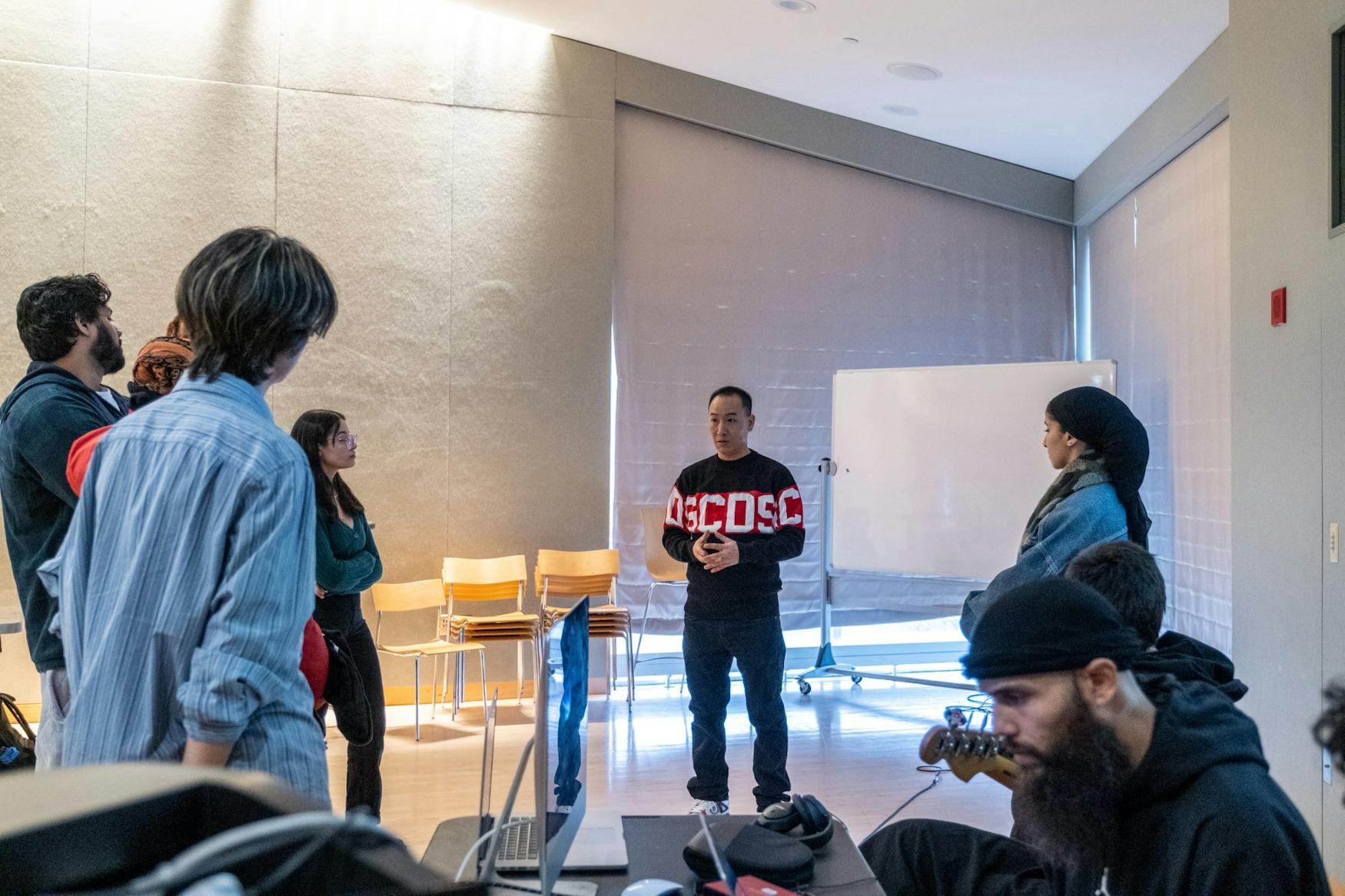Industry expert Jimmy Kang leads audio engineering workshop
The hip-hop producer and manager showcased his expertise in the process of mixing, mastering, and networking for Brandeis musicians.
On March 25, producer Jimmy Kang held a workshop in music production in the Shapiro Campus Center multi-purpose room where he relayed knowledge of the entertainment industry for students interested in the business. The event, sponsored by Basement Records, COMPACT, and SIMS, drew in a diverse group of creatives, from aspiring producers to songwriters spanning a multitude of genres. Recently striking a distribution deal with Sony Orchard, Kang realized the opportunity for students to collaborate on a song to be released under the company.
The Digital Audio Workstation (DAW) utilized for this workshop was ProTools, the software preferred by professional producers in the hip-hop genre. Kang emphasized the importance of learning the ropes of ProTools as it is widely considered the industry standard. “Copy something that’s actually working and learn to master it,” he recommended. Dizzy, one of Kang’s mentees, echoed him in speaking on the value of investing in ProTools, as opposed to other less expensive DAW’s: “When was the last time you bought something from the Dollar Tree that lasted more than three months?”
Dizzy also emphasized the fact that it doesn’t matter where you’re recording, but the software and hardware used are highly important. “A chef can cook you a five-course masterpiece meal anywhere if he has the proper ingredients,” he said. The nature of the event proved this aphorism accurate, as the attendees managed to craft a track together in a makeshift studio, which consisted of only a laptop, an interface, a couple of midi keyboards, a mic, and a set of headphones — all scattered across a single desk.
Kang divided the attendees into two groups: the songwriters and the producers. The songwriters collaborated on ideas and provided feedback for one another as each wrote their own verses to sing or rap over the producers’ instrumental track. “[The workshop] brought to my attention how talented a lot of the student body is, and the potential we have when we work together,” said musician and Basement Records’ Artistic Director Simon Fidlin ’24. One student connected their electric bass into the software and recorded variations of potential basslines for the song. “There’s a place in the industry for everyone,” Dizzy said.
As the producers polished and refined the instrumental track, which played aloud on a loop, Dizzy began to rap a set of freestyled lyrics, grabbing ideas from his surroundings, from the text on people’s graphic hoodies to the brand names of their sneakers. He seamlessly passed the spotlight to other students who followed suit in freestyling over the ongoing beat.
Once the instrumentals were set, each of the songwriters recorded layers of their vocals into the track, from the main melodies to the minute ad-lib details.
After the song was mixed by Rigo — another one of Kang’s mentees — Kang himself demonstrated how to master the sounds of the track and level the frequencies. He noted, “You don’t want the person who mixed it to master, you need a different ear.”
With a refreshingly realistic outlook on the state of the industry today, Kang advised attendees on how to get their foot in the door. He iterated that in order to navigate the industry, you need money to publicize and market. “Everything is about marketing,” he said, “... the thing that costs the most in the music game is marketing.” He explained that if an artist doesn’t have money, it’s helpful to find an investor.
Kang is known for his perceptive business sense as he runs multiple businesses, within and outside of the music industry, such as Str8Up Entertainment Group INC, Wu-Tang Management, a custom clothing shop, and even a convenience store in downtown Worcester, MA. “You have to figure out, in the music game, you’re not going to consistently make money. There’s ups and downs in this game. So while you’re at your low point you have to have other businesses.” He strongly emphasized the need to be independent as an aspiring musician to protect one’s own vision and avoid being controlled by others in the business. He pointed out Dizzy as a positive example, who screen-printed his own merchandise.
Another piece of wisdom that Kang offered is to keep in mind that there are only three major record labels — Universal Music Group, Sony Music, and Warner Music Group — all others being mere subsidiaries of them. He advised against striving to get signed with one of the big labels, and said to rather seek out distribution companies, such as Sony Orchard. Kang believes the platform will elevate his artists from the underground music world to the mainstream. Through Basement Records, the Orchard will remain open to the Brandeis community indefinitely, offering services that include marketing, advertising, rights management, physical and digital distribution, and more.




Please note All comments are eligible for publication in The Justice.